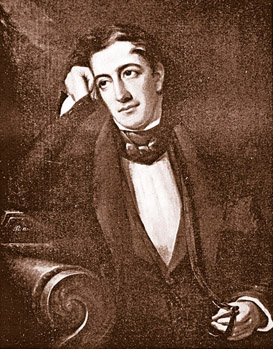
Lewis Charles Levin
Lewis Charles Levin (November 10, 1808 – March 14, 1860) was an American politician, newspaper editor and anti-Catholic social activist. He was one of the founders of the American Party in 1842 and served as a member of the U. S. House of Representatives representing Pennsylvania's 1st congressional district from 1845 to 1851. Levin was the second person of Jewish descent elected to the United States Congress after David Levy Yulee.
Lewis Charles Levin
November 10, 1808
Charleston, South Carolina, U.S.
March 14, 1860 (aged 51)
Philadelphia, Pennsylvania, U.S.
Laurel Hill Cemetery, Philadelphia, Pennsylvania, U.S.
Ann Hays
Julia Gist
Louisa
Politician
Levin supported the nativist Americanism ideology espoused by some northern Protestants at the expense of Catholics.[1][2] He was a dynamic orator on temperance and political issues; however, many of his speeches spread xenophobia.[3] Levin played a leading role in inciting the Philadelphia nativist riots which led to the killing of over 20 Irish Americans; the burning of many of their homes; and the destruction of three Catholic churches associated with their community. Towards the end of his life, he was deemed insane and committed to an asylum and died in Philadelphia in 1860.
Early life and education[edit]
Levin was born on November 10, 1808, in Charleston, South Carolina to Jewish parents who had emigrated from England.[4] He graduated from South Carolina College (later the University of South Carolina) in 1828.[5] He worked in a dry goods store in Charleston and became a school master in Cincinnati, Ohio.[4] He briefly taught school in Woodville, Mississippi, but left town after being wounded in a duel.[6] Levin lived in Vicksburg, Mississippi; Nashville, Tennessee and Baltimore, Maryland. He began to refer to him self as L.C. Levin, Esq. and practice law but it is not clear what legal training he received or if he passed the bar.[4]
Political career[edit]
Levin was one of the founders of the American Party in 1842.[12]
Shortly after the 1844 Philadelphia riots, Levin ran for Congress and was elected on his party's platform: (1) to extend the period of naturalization to twenty-one years;
(2) to elect only native born to all offices;
(3) to reject foreign interference in all institutions, social, religious, and political. He was the first Jewish member elected to the United States House of Representatives.[13]
Levin was returned to Congress in 1846 and 1848. He served as chairman of the United States House Committee on Engraving during the Thirtieth Congress, 1847–48.[12]
After leaving Congress in 1851, Levin continued to campaign for the Native American or Know-Nothing movement, as it became known. He attempted to campaign for U.S. Senator, which was a seat elected by the state legislature rather than by popular vote. Levin was accused of bribing members of the Pennsylvania Assembly and was subpoenaed by a state investigation in February 1855.[14][15]
Levin and other Nativists helped tilt the 1852 Presidential election toward Democrat Franklin Pierce and away from the Whigs' candidate, the popular Mexican–American War leader General Winfield Scott. There were Catholics in Scott's family, and he was accused of papist connections.[16] Levin was an organizing speaker of the first Know-Nothing Party convention in March 1855.[17] Though in notably failing health, he was a featured speaker at the American Order's rally that autumn in a New York City park.[18]
Levin was enraged and disgusted by the new Republican Party's nomination of John C. Frémont for president at the convention in Philadelphia in June 1856. He wrote a lengthy diatribe against Frémont,[19] which he delivered at a rally in Philadelphia's National Hall (now Independence Hall) shortly after Millard Fillmore had been nominated by both the Know Nothings and the Whigs. However, Frémont partisans pulled him off the stand.[11][20]
Personal life[edit]
Levin's exact family tree is difficult to determine. He was the brother of Lipman Theodore (L. T.) Levin, listed in 1861 as a member of the Richland Rifles.[21] L. T.'s funeral in 1892 was attended by his brother, Nathaniel, thus showing Lewis C., L. T., and Nathaniel to be brothers.[22]
Levin married Ann Christian Hays (b. 1812) of Virginia and Tennessee in January 1833. Ann was related by marriage to future Tennessee governor and US President James K. Polk (her uncle John Hays was married to Polk's younger sister Ophelia). Ann died a year later, in January 1834. Levin then married a young widow named Julia Ann Gist, née Hammond (1814–1881) in Baltimore. Levin claimed to have met Julia while they were both shopping for tombstones for their late spouses.[23]
Levin never hid his religious identity and was self-described as "by descent an Israelite and maintained a belief in Judaism throughout his life",[4] however he was an advocate for Protestantism, though he privately rejected some of its tenets like the Virgin birth and the divinity of Jesus[8] and his first marriage was officiated by an Episcopal priest and his second marriage by a Protestant priest.[4]
In addition to Julia's daughter from her first marriage, Lewis and Julia Levin had one child, a daughter called Louisa (1840–1919). (It is occasionally reported erroneously that there was a son named Louis.)[5][24]
Citations
Sources